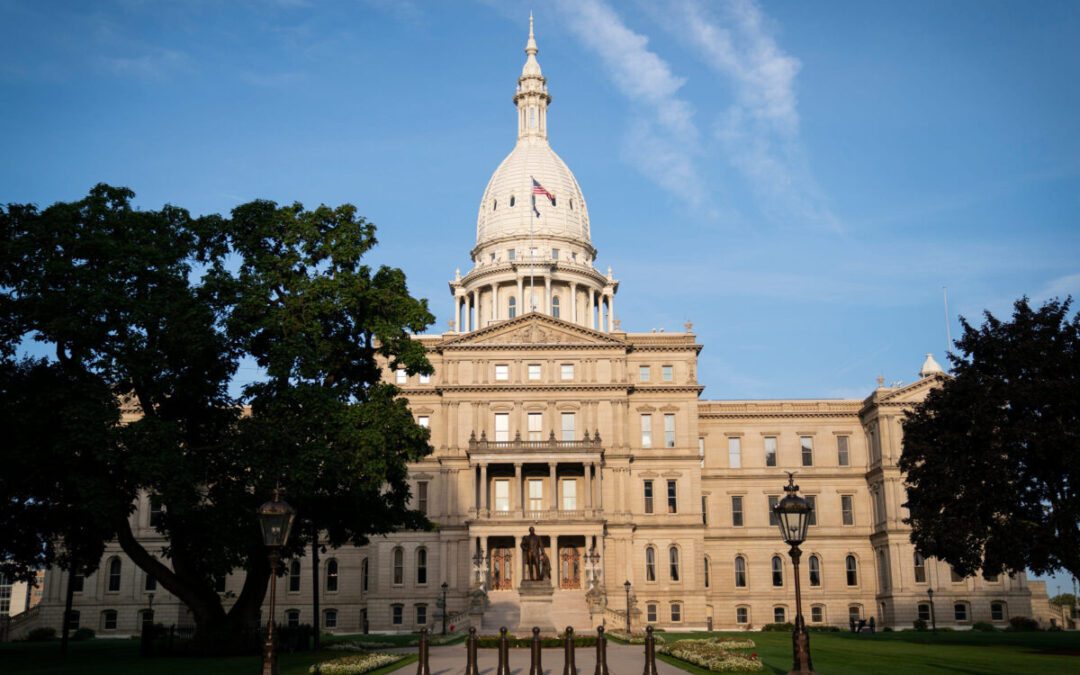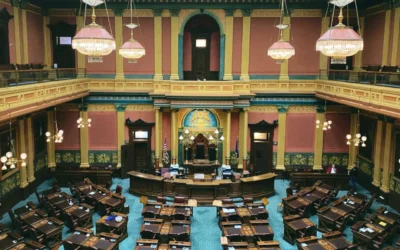
Gov. Gretchen Whitmer signed more than 300 bills into state law in 2023—and many of them set to take effect next month.
MICHIGAN—After taking full control of both chambers of Michigan’s state legislature last year, Democratic state lawmakers kept busy by passing more than 300 bills into law. Many of them are set to take effect on Feb. 13. Here’s an overview of some of the biggest changes en route:
Tax Cuts and Rebates
Beginning next month, more than 700,000 Michigan families will begin receiving one-time tax rebate checks of about $550 each, Gov. Gretchen Whitmer’s office announced last month.
State officials said the rebates are arriving ahead of schedule this year as part of $1 billion in tax cuts that Whitmer signed into law in 2023. That includes legislation that effectively quintupled Michigan’s Working Families Tax Credit to 30% of the federal Earned Income Tax Credit and retroactively provided credits of up to $2,080 for tax year 2022 and $2,229 for tax year 2023.
The tax cuts translate to an estimated average combined refund of $3,150 for 700,000 families.
Whitmer also signed legislation to phase out the state’s retirement tax, which, over the next three years, is expected to save about 500,000 Michigan households at least $1,000 annually.
Gun Safety Reform
In the wake of a deadly mass shooting at Michigan State University, Democratic state lawmakers moved quickly in 2023 to pass into law several long-sought gun safety bills.
The new laws that take effect next month will require:
- Background checks to be conducted before all gun purchases in Michigan.
- Guns to be locked away safely when kids are present (or likely to be present) in a home.
Another new law signed last year by Gov. Gretchen Whitmer will also enable circuit court judges in Michigan to issue extreme risk protection orders, which can temporarily prevent those deemed to pose a danger to themselves or others from possessing or purchasing a firearm.
Also beginning in February: A new state law will temporarily prohibit those convicted of domestic violence (including misdemeanors) from owning or buying a firearm for a period of eight years.
Minimum Wage Boost
An automatic increase to the state’s minimum wage took effect on Jan. 1, boosting wages from $10.10 to $10.33 an hour for an estimated 52,000 Michiganders who are paid minimum wage.
But if an advocacy group has its way in court or Michigan voters are able to approve a ballot initiative at the polls this year, that minimum rate could be set for a much more significant jump—including an immediate boost to $12 an hour and another increase to $15 by 2025.
Reproductive Freedom
An unenforceable abortion ban from 1931 is set to be erased from state law in February after Whitmer signed legislation last year to repeal the archaic prohibition. The new law effectively guarantees reproductive freedoms for Michiganders after 57% of voters in 2022 approved Proposal 3—a citizen-led ballot initiative enshrining reproductive rights in the state constitution.
With the signing of the Reproductive Health Act, Michigan is also set to repeal several “medically unnecessary” restrictions on abortion providers next month—all with the overarching goal of protecting and expanding access to affordable care for more Michiganders statewide.
That includes the repeal of Michigan’s so-called “rape insurance” law that has banned insurance companies from offering coverage for abortion without forcing women to buy a separate rider. Beginning next month, providers will be able to wrap abortion coverage into their existing plans.
Workers’ Rights
Michigan, long known as a mainstay of organized labor, last year became the first state in decades to restore workers’ rights after Democrats repealed an anti-union law known as “right-to-work” that was passed over a decade ago by a Republican-controlled Legislature.
The state’s “right-to-work” law had allowed those in unionized workplaces to opt out of paying union dues and fees, which effectively deprived unions of funds and weakened their ability to fund unionization efforts and negotiate strong contracts. Beginning in February, labor unions will once again be able to require workers to pay dues in exchange for their union representation.
Union leaders have said the change will strengthen their bargaining power against corporations and lead to better pay and benefits for workers—much like the United Auto Workers’ six-week strike against the Detroit Three did last year.
Clean Energy
Long-awaited legislation signed into law by Whitmer in November is set to create new clean energy standards for electricity providers in Michigan, requiring them to gradually source most—and eventually all—of their energy through renewable sources over the next 17 years.
The legislation didn’t create any immediate clean energy benchmarks for 2024. But later this year, the state will have new authority to approve construction permits for large-scale wind, solar, and battery facilities that have hit local roadblocks, reports Crain’s Detroit Business.
In addition to helping tackle the climate change crisis and protect the environment, Democratic lawmakers said the bills would also create new energy efficiency programs that will translate to savings for Michiganders who are frustrated with the ever-rising cost of their energy bills.
Civil Rights
Whitmer signed a bill last year to expand the state’s civil rights law to prohibit discrimination based on sexual orientation, gender identity, or expression. It’s set to go into effect in February.
Michigan’s civil rights act already prohibited discrimination in employment, housing, and public services based on religion, race, color, national origin, age, sex, height, weight, familial status, or marital status. But the new changes are designed to curb discrimination against the nearly two-thirds of LGBTQ individuals who report experiencing discrimination in their everyday lives.
Over the summer, Democratic lawmakers took those protections a step further with legislation to protect workers from employment discrimination if they had an abortion. In May, Whitmer also signed Democratic-led bills that effectively banned mental health providers in Michigan from offering any therapy that attempts to change the sexual orientation or gender identity of children.
Both of those sets of bills are also set to take effect in February.
Public Education
In March, Whitmer signed a bill to repeal a controversial state law that for years has punished Michigan students who fall behind more than one grade level in reading and writing by forcing them to repeat the third grade. And in November, she signed long-sought legislation to make changes to the way public school teachers are evaluated based on student test scores.
Both of those bills are set to take effect in February.
Whitmer also signed three bills into law in October known as the “Filter First Bills,” which will make Michigan the first state in the nation to require schools and child care centers to install water filters and conduct routine testing for potential lead contamination in drinking water.
That legislation requires schools and child care centers to assemble an action plan by 2025.
Voting Rights
State legislation passed and signed into law last year is set to boost voter registration opportunities, improve efficiencies on Election Day, protect poll workers, and ensure that all Michiganders have equal access to the ballot box ahead of this year’s general election.
Most of the laws will take effect in February—including allowing 16-year-olds to pre-register to vote before they can legally vote once they turn 18. The laws will also automatically register eligible Michigan residents to vote when released from prison, making Michigan the first state in the US to pass such a law.
The package of laws also includes reforms that criminalize acts of intimidation against poll workers and other election officials on Election Day, as well as those that aim to curb the deceptive use of artificial intelligence and so-called “deepfakes” in political ads—namely by requiring clear labels on materials that are created using some type of artificial intelligence.
Michigan lawmakers also passed legislation that will require at least nine days of early in-person voting beginning with this year’s presidential primary election, which is Feb. 27. And under Proposal 2, all Michigan voters can now sign up to vote by mail in every election as part of a new, permanent absentee voter list.
Health Care Protections
Other legislation taking effect in February aims to protect health care access for all Michiganders and make it harder for the federal government or the US Supreme Court to claw back health care access, as it did with its repeal of Roe v. Wade.
In October, Whitmer signed eight bills to embed several provisions of the Affordable Care Act (ACA) into state law, ensuring that Michiganders are at least temporarily protected from any attempts by Republicans in Congress to repeal them—or to have the courts strike them down.
In addition to allowing dependents to remain on a parent’s insurance plan until age 26, the bills mirror federal law in preventing insurers from denying coverage based on pre-existing conditions or discriminating against patients based on their gender identity or sexual orientation.
Other recently signed state laws—all of which mirror the Affordable Care Act—will prohibit insurers from instituting annual or lifetime limits on coverage and require them to provide coverage for specified services like hospitalization, pregnancy, and emergency services.
READ MORE: What happens when voters put Dems in charge of a state government?
For the latest Michigan news, follow The ‘Gander on Twitter.
Follow Political Correspondent Kyle Kaminski here.
Support Our Cause
Thank you for taking the time to read our work. Before you go, we hope you'll consider supporting our values-driven journalism, which has always strived to make clear what's really at stake for Michiganders and our future.
Since day one, our goal here at The 'Gander has always been to empower people across the state with fact-based news and information. We believe that when people are armed with knowledge about what's happening in their local, state, and federal governments—including who is working on their behalf and who is actively trying to block efforts aimed at improving the daily lives of Michigan families—they will be inspired to become civically engaged.


Michigan Senate passes petition collection, election disinformation reforms
BY BEN SOLIS, MICHIGAN ADVANCE MICHIGAN—The fight against election disinformation and changes to Michigan’s petition circulation process cleared the...

Michigan OKs landmark regulations that push up-front costs to data centers
Michigan regulators on Thursday adopted landmark standards for the booming data center industry with a plan they say tries to protect residents from...

Q&A: Why this 29-year-old Detroiter thinks he can make Michigan government work again
Democratic state Senate candidate Justin Onwenu says he wants to rebuild trust, invest in neighborhoods, and help deliver a new generation of...

Michigan state budget 2026: 7 things to know about the bills
LANSING — Lawmakers on Oct. 2 and Oct. 3 voted to approve a 2026 budget plan that makes cuts to many state agencies while boosting funding...

Michigan Legislature passes eight day continuation budget, votes expected Thursday
BY BEN SOLIS AND KYLE DAVIDSON, MICHIGAN ADVANCE LANSING—In the thick of a government shutdown that lasted just one hour, the Michigan House and...





